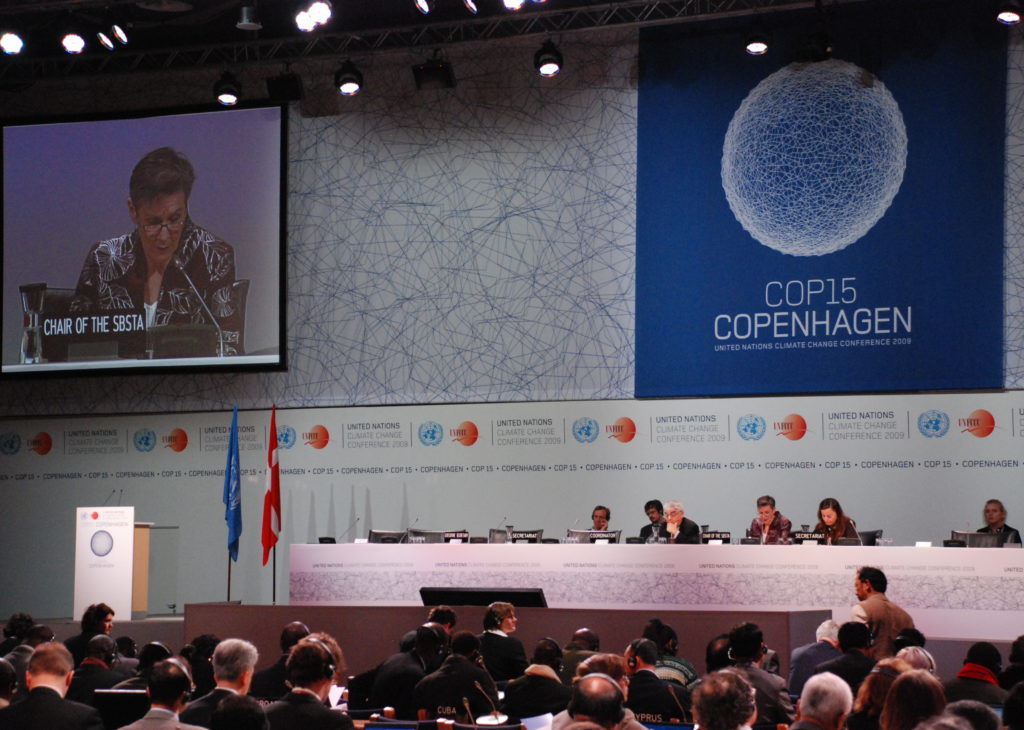Big Oil vs. Obama in Copenhagen: Lessons from California

 After accepting the Nobel Peace Prize in Oslo, President Obama will go to Copenhagen to deliver a proposal for U.S. greenhouse gas emissions.
After accepting the Nobel Peace Prize in Oslo, President Obama will go to Copenhagen to deliver a proposal for U.S. greenhouse gas emissions.
Unfortunately, the President leaves for these critical international talks on climate change shrouded in a “petroleum-powered smoke screen, ” a phrase I first heard used by Terry Tamminen, former Secretary of California’s Environmental Protection Agency.
In the United States, petroleum accounts for more than 40 % of total CO2 emissions from all forms of fossil fuel combustion (the burning of fuels, including coal, oil, and natural gas to produce energy and to power vehicles) – more than any other fuel. Per capita, we Americans remain the largest source of greenhouse gas emissions in the world.
Thus in order to tackle climate change, we must tackle oil.
This will not be easy, as the corporations that contribute the most to the nation’s greenhouse gas footprint also happen to be the largest corporations (measured by revenue) on the planet. Shell is the world’s largest corporation, Exxon Mobil is second, BP is fourth, and Chevron is fifth (Wal-Mart is the missing number 3). In fact, in 2009 for the first time in history, seven of the ten largest corporations in the world are now oil companies. They are, hands down, the wealthiest corporations the world has ever known. Exxon Mobil earned the highest profits of any corporation in world history in 2003 and has topped those profits every single year hence. Chevron, the second largest U.S. oil company, had 2008 revenues so large that only 36 countries had GDPs that could top them.
This unparalleled wealth translates into vast political power–power used to reduce and circumvent vital regulation at the state, national and international levels to reign in these deadly emissions.
I was reminded of Tamminen’s phrase a few weeks ago, when California released its first annual greenhouse gas emissions report mandated by the state’s groundbreaking 2006 climate change law (AB 32). The report compiles greenhouse gas emissions data from all major stationary sources (as opposed to mobile sources like cars, trucks or trains). It reveals that, just as in the nation as a whole, oil is the greatest source of greenhouse gas emissions in California. Chevron is also the state’s single largest contributor. All but one of California’s highest stationary emitters are petroleum refineries: Chevron’s Richmond and El Segundo facilities, Shell’s Martinez refinery, BP’s Carson refinery, and Exxon Mobil’s Torrance refinery.
I interviewed Tamminen in a 2008 for my book, The Tyranny of Oil. He told me of his efforts to include regulation (rather than just reporting) in California’s law. He first met with the state’s largest refiners and asked for their support, knowing that without it, the draft law was dead on arrival.
Tamminen had reason to believe he would get the oil industry’s backing, given that his friend, close ally and boss, Arnold Schwarzenegger, was a popular governor whom the industry had helped to elect.
The oil companies, however, had a different idea about the legislation: in return for agreeing to some regulations to reduce emissions at their refineries, “They wanted relief from [existing] regulatory requirements on those and any future refineries that would have made their air pollution even worse.” In other words, in order to agree to one set of regulations, they wanted the state to allow them to pollute even more.
Tamminen got AB 32 through, but without the regulations, and eventually left his job, explaining that it was “nearly impossible to perform that function [of a government regulator] sitting on the other side of the petroleum-powered smoke screen.”
Today, an even more dominant oil industry has turned its unequaled financial power into a record-breaking lobbying blitz to stop meaningful domestic and international climate legislation.
According to the Center for Responsive Politics, the oil industry spent more than $132 million lobbying the federal government on all issues in 2008 (expenditures by issue area are not available), a 65% increase over 2007, itself a record-breaking year, and 2009 is on track to hit new heights. Of the top fifteen lobbying spenders on all issues in 2009, four are oil companies, while the largest, the U.S. Chamber of Commerce, is both heavily funded by the oil and fossil fuel industry and is leading the charge against meaningful climate legislation.
The blitz is working.
It has been reported that in Copenhagen, President Obama plans to announce reductions that mirror the targets adopted by the House of Representatives: at best, 4% below 1990 levels by 2020. The Intergovernmental Panel on Climate Change has found that a 25-40% cut from 1990 levels is required of developed countries if the world is to have roughly a fifty-fifty shot at averting the most dangerous possible outcomes of climate change.
For President Obama to come out in Copenhagen for regulations that will truly save both people and the planet, then the nation will have to learn from California’s failures and force the oil industry to behave.
Today in California, Chevron’s world headquarters was surrounded by people protesting the oil company, declaring “Our climate is not your business!”
The petroleum-powered smokescreen must be exposed, blown away, and replaced with fresh air and clear skies once and for all.
